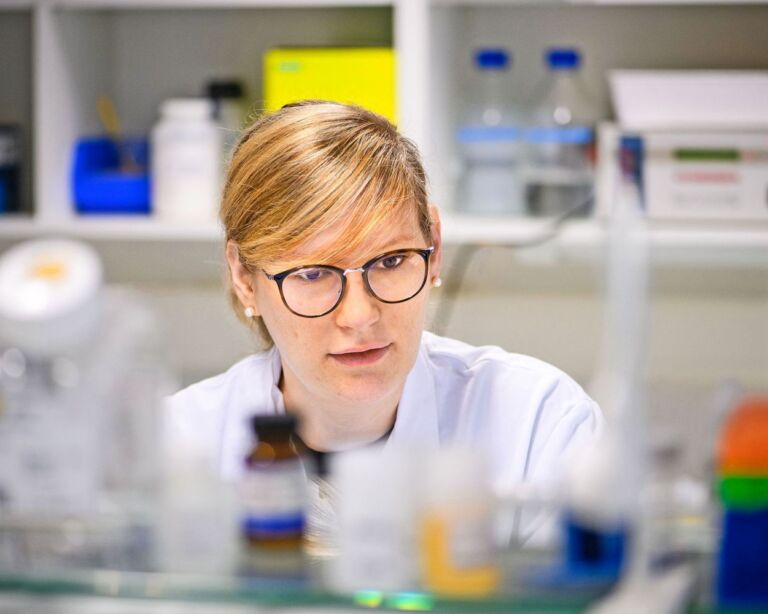Overview: What is pancreatic cancer?
Pancreatic cancer, also known as pancreatic carcinoma, is a malignant tumor of the pancreas. A distinction can be made between different pancreatic carcinomas:
- If the cancer develops in the so-called “head” of the pancreas near the bile duct, it is known as pancreatic head carcinoma.
- In over 95 percent of cases, pancreatic cancer occurs in the part of the gland that produces and secretes digestive enzymes. Then it is an exocrine pancreatic carcinoma.
- Less frequently, the cancer originates from the hormone-producing cells of the pancreas. These tumors are often less aggressive and are treated differently
Pancreatic cancer – frequency and age
Pancreatic cancer usually only occurs at an advanced age. The average age of onset for men is around 70 years and for women around 75 years. In Switzerland, around 1,300 people are diagnosed with pancreatic cancer every year. This corresponds to around three percent of all cancers.
Pancreatic cancer is usually only discovered at an advanced stage. The cancer has then often already visibly or invisibly spread to other organs, i.e. formed metastases. Early diagnosis offers better treatment options.
Liver and Pancreas Tumor Center
At the USZ, numerous specialist departments have joined forces to form a liver and pancreatic tumor center. The center is certified according to the guidelines of the German Cancer Society (DKG). A team of experts specializing in the medical treatment of pancreatic cancer works closely together here for the benefit of our patients. At DKG-certified centers, patients are treated according to strict quality criteria and, according to current studies, have a better chance of survival on average.
Pancreatic cancer: causes and risk factors
There is often no tangible reason why a person develops pancreatic cancer. However, there are various factors that increase the risk.
Risk factors for pancreatic cancer
Lifestyle and certain pre-existing conditions can increase the risk of developing pancreatic cancer. Typical risk factors are
- Smoking,
- Excessive alcohol consumption,
- Obesity (body mass index greater than 30),
- Chronic pancreatitis,
- Diabetes mellitus
Genetic factors
Hereditary predisposition can play a role in the development of pancreatic cancer. If a relative or first-degree relative (parents, siblings, children) has pancreatic cancer, the likelihood of developing pancreatic cancer yourself is higher. Pancreatic cancer also occurs more frequently in the context of so-called tumor predisposition syndromes such as hereditary breast-ovarian cancer syndrome.
Symptoms: Pancreatic cancer is very difficult to detect
Pancreatic cancer often causes hardly any symptoms in the early stages. Specific symptoms often only appear at an advanced stage. Classic signs of pancreatic cancer are jaundice, upper abdominal pain and weight loss. The growing pancreatic tumor can also impair the production of digestive juices in the pancreas or their drainage into the duodenum. This leads to increased excretion of undigested fat in the stool (so-called fatty stools).
More advanced tumors can cause the following symptoms:
- Loss of appetite
- Feeling of pressure in the stomach
- Back pain
- Weight loss
- Nausea
- Vomiting
- Upper abdominal pain
- Jaundice
Pancreatic cancer: Diagnosis with us
Early diagnosis is very important in the case of pancreatic cancer. This means that there is at least a small chance of completely removing the tumor surgically and, in combination with chemotherapy, curing it in individual cases. If you notice symptoms, it is therefore advisable to always get to the bottom of them at an early stage.
If pancreatic cancer is suspected, the next step is to determine the location, extent and spread of the pancreatic cancer. After this tumor staging, the subsequent therapy is planned as part of the tumor board.
Second opinion for pancreatic cancer
When a cancer diagnosis is made, a second medical opinion is an important decision-making tool. The Comprehensive Cancer Center Zurich supports you with a professional expert opinion. They receive a thorough analysis of the situation as well as personal advice and quick answers to their questions.
Pancreatic cancer: prevention, early detection, prognosis
You can prevent pancreatic cancer by avoiding the known risk factors and maintaining a healthy lifestyle:
- Make sure you eat a balanced diet with plenty of fruit and vegetables.
- Avoid being very overweight.
- Refrain from smoking.
- Avoid excessive alcohol consumption.
Progression and prognosis of pancreatic cancer
The chances of a cure for pancreatic cancer are still low, with only around 10% of all patients still alive five years after initial diagnosis. Early detection of pancreatic cancer is beneficial for the prognosis. If the tumor is small and the surrounding vessels and lymph nodes are not affected, the best chance of recovery is complete surgical removal followed by six months of chemotherapy. Pancreatic tumors that originate from the hormone-producing cells, so-called neuroendocrine pancreatic tumors, have much better chances of recovery.
Self-help groups
The exchange with people who are affected by the same disease can be a great support in coping with the disease. Advice on finding a suitable self-help group is available from
Selbsthilfe Zürich. Self-Help Zurich and the University Hospital Zurich are cooperation partners in the national project “Health literacy thanks to self-help-friendly hospitals”.
Pancreatic cancer: Treatment - chemo or surgery?
If pancreatic cancer is discovered in time, we try to remove the tumor during an operation. Afterwards, chemotherapeutic follow-up treatment is essential, as otherwise the relapse rate is over 90%. If the pancreatic cancer is too advanced, surgery is no longer possible. The tumor can then be pre-treated with highly effective chemotherapy. In some cases, this makes surgery possible. In cases where this does not occur or the tumor has already visibly metastasized, chemotherapy and, in rare cases, radiotherapy can prolong survival with the disease and alleviate the course of the disease and improve quality of life.

